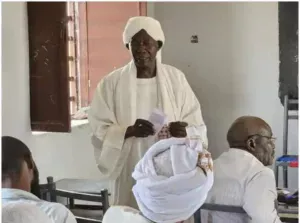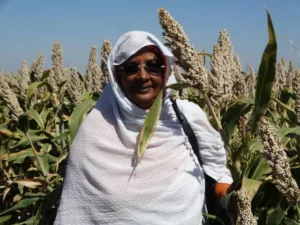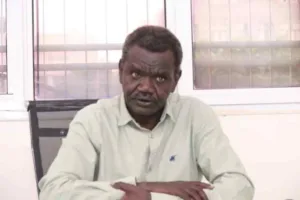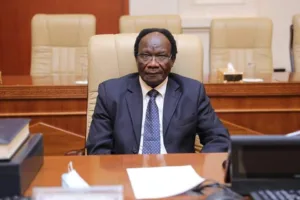Because of the war… fears of the collapse of a strategic dam and the failure of agricultural campaigns in Sudan Report: Al-Nour Abdullah Mohamadeen.

Experts have warned of the repercussions of the security situation in the Jabal Awliya reservoir, located in the north of White Nile State, which continues to suffer from the lack of technical management since the fighting that continued to take place in the area last November, which made it difficult for the technical team that controls the dam gates to arrive.
The Jabal Awliya reservoir was created in 1937 AD. It is located 44 kilometres (27.3 mi) south of central Khartoum, to be used to raise the water level in areas south of the dam on the east and west banks, so that the White Nile agricultural projects could be irrigated using pumps.
☆ Urgent call
Experts Urgently Appeal to Both Sides in Conflict
It is necessary to allow technical teams to access the dam to carry out their missions, especially since the control of the reservoir valves has become linked to the agricultural season.
In an open letter from the Chairman of the White Nile Farmers Association, Youssef Al-Hassani, to the Governor of White Nile and the Rapid Support Command, he confirmed that the state's irrigated projects are threatened with being out of agricultural season due to the decline in the water level of the Nile located south of the reservoir, which is controlled, especially after it fell out of the technical management system due to the battles in this sector.
Youssef Al-Hassani points out in his letter titled that the reservoir has an operating system that is constantly carried out by engineers and technicians, using technical procedures to provide levels in the fields of the agricultural project south of the reservoir and maintain the water level below the reservoir.
☆ Absence of engineers
He stressed that there is no operating engineer in the reservoir due to this war in the reservoir area and the gates have remained without scientific management, and all the water revenues that were allocated to agricultural projects south of the reservoir, including the national sugar projects in the White Nile and all agricultural projects, will go to the north and otherwise the technicians coordinate the water regulation process, because the damage will be great if the projects south of the reservoir are removed from the agricultural process.
The message from the Chairman of the White Nile Farmers Association stated: “We, as farmers involved in irrigation projects and good citizens, make this appeal and address it to both parties to address the problem and coordinate the management of irrigation by sending engineers and ensuring their safety. for the technical operation of this facility so that we can catch up with the current agricultural season, in line with the coordination experiences that have been carried out. It was carried out to maintain some damaged facilities, such as communications, electricity and water. services in some areas of armed conflict.
☆ Battles around the tank
In this context, he said: The Secretary General of the White Nile Resources Development Organization (NORA) – the national expert in public-private partnership – Engineer Dr. Muhammad Abdel-Rahman Dhawi We all know the battles between the fighters to control the passage of the Jabal Awliya reservoir.
This site is known to be located at the extreme edge of the White Nile State borders and is working to organize irrigation operations for all irrigated agricultural projects including the Kenana Sugar Projects, White Nile Sugar Projects, Asalaya Sugar Projects, and all the livelihood project pumps on the east and west banks, up to the Sudanese borders and state borders to the south.
Dr. Dhawi added with a sigh, “The bitter truth remains that in light of this exchange of heavy weapons in the area of this edifice, there will be no opportunity for the engineers, technicians and workers of this reservoir to carry out their important operational work, which relies on information about the amount of flows and discharges required to maintain the integrity of the reservoir and maintain the inflow levels. Expressing his question about the fate of the operation of the dam and the investments associated with it and the lives and livelihoods of the citizens of the state, what are the expectations and what should be done to avoid the negative results expected from the absence of the operators of this reservoir.
He added: “We hope that the disasters we expect or see will not come true in addition to this tragedy that the country is experiencing.”
☆ Experts' concerns
The speech by Dr. Dhawi, Secretary General of the White Nile Resources Development Organization (NORA), is not the first of its kind. Rather, the organization has been monitoring the repercussions of the situation in the dam since the fighting began around it. Rather, it was to seek the need to open a safe passage for the engineers, technicians and workers of the reservoir to carry out their important work of exploitation, which is based on the amount of flows, water levels, necessary drainage and the necessary water level. maintain the levels of the exhaust inlets of the pumps of these projects.
☆ The next danger
Meanwhile, expert engineer Professor Taj Al-Din Al-Khazain – the main advisor of the Sub-Saharan Center – warned of the danger coming from the lake, due to the high rainfall rates this year, revealing that the rain level in Lake Victoria increased from 13.55 m/h to 13.66 m/h. He expects the water to flow south and then to the area of dams and reservoirs. He stressed that the reservoir cannot accommodate this amount of water. due to the presence of a 5 megawatt turbine valve only. He explained that the Jabal Awliya reservoir was built to regulate water only without storage. He warned that areas 40 kilometers long would be affected by the flood.
☆ Contact the authorities
Earlier, Nora organization had stressed the need to address the White Nile authorities, represented by the government secretariat and the Ministry of Agriculture, on the seriousness of the clashes taking place in the Jebel Awlia reservoir area and their impact on the agricultural seasons.
The organization called for an effective role of FAO, IGAD and the African Union due to the gravity of the situation and its impact on agricultural campaigns.
☆ Hedges and steps
Economic expert and former Minister of Investment, Dr. Al-Hadi Muhammad Ibrahim said that precautions and proactive measures in the face of what is happening in the reservoir area are important not only for the success of the agricultural season in the state, but also to avoid major risks that may lead to the destruction of the Nile Ribbon, including the national capital and cities located on the banks of the Nile, due to the collapse of this vital reservoir resulting from the ongoing conflict.
Rumors were circulating about the destruction of the dam, but the head of the Noura Organization, the former Minister of Agriculture of the White Nile, Engineer Fatima Ahmed Abdel Karim, at the same time confirmed that the main body of the reservoir was intact. What was destroyed was the crane that controlled the reservoir gates, which collapsed and fell on part of the body and assured that it was maintainable and rehabilitated. She stressed that investors are afraid to invest in agricultural projects this season, due to the security situation and also the delay in the arrival of water to the pumping cells, especially in the northern regions, and that investors have demanded security for agricultural investments.
☆ Anxiety and dark future
Amid growing concern among experts and farmers, both sides in the conflict have not expressed any comment on the evolving situation inside the strategic dam, with continued repeated fighting in the area and failure to open safe corridors, raising concern over the current situation with a serious danger threatening the collapse of the dam and painting a bleak future for agricultural activities around the lake.









